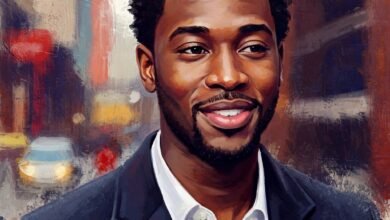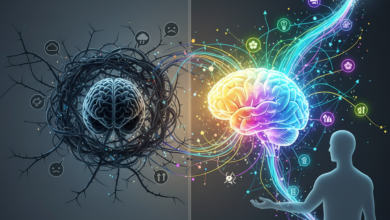Negan Unmasked: A Deep Character Analysis of The Walking Dead’s Villain-Turned-Hero

Introduction to Negan: The Villain We Love to Hate
In the realm of television, few characters evoke such polarizing emotions as Negan from The Walking Dead. Introduced as the formidable antagonist, Negan quickly establishes himself as a significant presence in the post-apocalyptic landscape. His initial portrayal is one that embodies the traits of a classic villain: brutality, cunning, and an unwavering thirst for control. Yet, it is these very traits that render him a memorable antihero, positioning him as a complex character whose motivations go beyond mere villainy.
Negan’s character is characterized by a unique blend of charisma and cruelty. His infamous weapon of choice, Lucille—a barbed-wire-covered baseball bat—serves not only as a tool for terror, but also symbolizes his ruthless yet captivating persona. Despite his violent actions, Negan’s brash wit and ability to engage in dark humor create a certain allure, allowing viewers to see him in a light that is both menacing and strangely compelling. This complexity intrigues audiences, prompting them to question the nature of morality in a world where survival trumps ethical considerations.
Furthermore, Negan’s impact on The Walking Dead storyline is profound. His arrival marks a pivotal turning point in the series, shifting the narrative focus towards themes of power, loyalty, and the fragility of civilization. As viewers witness the leadership dynamics within Rick’s group and the challenges introduced by Negan’s Saviors, it becomes evident that his character is instrumental in shaping the direction of the plot. This intricate character study serves to enrich the overall narrative, compelling audiences to grapple with their conflicting feelings towards Negan. It becomes increasingly difficult to categorize him simply as a villain, as the journey through his character arc reveals layers of humanity and vulnerability hidden beneath his fierce exterior.
The Origins of Negan: Understanding His Backstory
Negan’s journey from a seemingly ordinary man to the infamous villain of The Walking Dead is profoundly shaped by the events of his early life. Born and raised in a suburban environment, Negan exhibited a somewhat typical upbringing, heavily influenced by his family’s dynamics. His relationships, particularly with his mother, father, and wife, played a crucial role in his development. Tragically, the death of his beloved wife, Lucille, due to cancer was a pivotal moment that profoundly altered his outlook on life.
Before the apocalypse, Negan held a teaching position, showcasing his capability to connect with individuals in a meaningful way. This career not only reflects his leadership potential but also indicates a capacity for compassion that starkly contrasts with his later persona. As the societal fabric began to unravel amid the chaos of the zombie outbreak, Negan’s innate leadership qualities emerged. His experiences in the pre-apocalyptic world solidified his understanding of power dynamics and survival, which would later define his role as the leader of the Saviors.
One of the defining elements of Negan’s backstory is his struggle with loss, which fosters a ruthless survival instinct. The grief stemming from Lucille’s death coupled with the collapse of society contributes significantly to his transformation. Negan comes to perceive the world as a place where only the strongest survive, leading him to develop a merciless approach towards maintaining order among his followers. This perspective, steeped in personal tragedy and loss, offers a glimpse into the complex character he becomes.
By examining Negan’s origins in detail, one can gain a greater understanding of the motivations behind his behavior throughout The Walking Dead. The amalgamation of his personal experiences, relationships, and the brutal realities of a post-apocalyptic landscape ultimately shapes Negan into one of the most multifaceted characters in the series.
Psychology of a Villain: What Drives Negan’s Actions?
Negan represents a multifaceted antagonist whose brutish behavior in “The Walking Dead” can be comprehensively understood through psychological analysis. At the core of his character lies a profound desire for power and control. In a post-apocalyptic world where survival is far from guaranteed, Negan’s authoritarian reign stems from a need to establish order amid chaos. The infamous Lucille, his baseball bat wrapped in barbed wire, symbolizes not only his violent methods but also his desire to impose his will on others, reflecting a distorted belief that fear equates to stability.
Survival in “The Walking Dead” universe is not merely a physical challenge but also a psychological one. Negan’s ruthless strategies highlight his adherence to a skewed form of morality, where might often dictates what is perceived as right. This warped sense of ethics allows him to justify his actions, even at the expense of others’ lives. His leadership of the Saviors reveals a belief system where loyalty is rewarded with survival, but betrayal is met with brutal punishment. This duality creates a façade of protection over a foundation built on fear, showcasing how power dynamics play a critical role in his decision-making process.
Furthermore, Negan’s past experiences contribute to his psychological profile. Loss and trauma have significantly influenced his worldview, shaping his interactions and relationships. His transformation from a charismatic leader to a tyrant raises pertinent questions about the nature of humanity in extreme circumstances. Ultimately, Negan’s character encapsulates the struggle between maintaining one’s humanity and succumbing to the primal instincts required for survival. This complexity not only makes him a compelling villain but also allows viewers to understand the psychological factors that drive his actions, leading to an exploration of empathy within the realm of villainy.
Negan’s Relationships: Allies, Enemies, and Redemption
Negan’s character arc in “The Walking Dead” is marked by his complex relationships with both allies and enemies, which ultimately play a crucial role in his transformation from villain to anti-hero. Initially introduced as a ruthless leader of the Saviors, Negan’s relationships were characterized by power dynamics rooted in fear and control. His brutal methods established him as an enemy to Rick Grimes and his group, creating a hostile environment that defined their interactions. The antagonism between Negan and Rick illustrates the classic struggle for power, a recurring theme throughout the series.
However, as the narrative progresses, it becomes evident that Negan’s connections are multifaceted. His relationship with certain allies, notably members of the Saviors, shows a different side of his character. Negan’s charismatic leadership inspired loyalty among his followers, highlighting his ability to forge relationships based on shared values and mutual survival in a post-apocalyptic world. Throughout this time, aspects of his personality, such as his humor and charm, emerge, making him a more relatable figure. This complexity sets the stage for his eventual redemption.
An essential turning point in Negan’s journey occurs after his imprisonment by Rick’s group. Here, Negan’s interactions with characters like Judith Grimes illustrate a significant shift in his psyche. Through these exchanges, he begins to reflect on his past actions and the consequences of his villainous behavior. His relationships with current and former enemies showcase his vulnerability and the desire for acceptance and redemption, fostering a deeper understanding of his character. These evolving dynamics contribute significantly to the overarching narrative, highlighting the transformative power of relationships in shaping his identity as a character molded by both conflict and compassion.
From Villain to Antihero: The Evolution of Negan’s Character
Negan Smith, introduced as the ruthless leader of the Saviors in The Walking Dead, epitomizes the complexity of human morality. Initially perceived as a tyrannical villain, his character arc showcases a multifaceted evolution that challenges viewers’ understanding of good and evil. From his first appearance in Season 6, Negan’s infamous introduction, marked by the brutal execution of key characters, firmly placed him in the audience’s collective disdain. His charismatic yet sadistic nature created a formidable antagonist, setting a dark tone for the series.
As the series progressed, particularly in Season 7 and beyond, the portrayal of Negan began to shift. The writers provided glimpses into his backstory, revealing the loss of his wife, Lucille, which humanized him and softened his image slightly. This deeper exploration of his character allowed viewers to understand his motivations and insecurities, transitioning him from merely a villain to a more complex character grappling with his humanity amidst chaos. Such character depth is crucial to understanding Negan’s role in the evolving narrative of The Walking Dead.
The transformation reached a significant point during Season 10, where Negan’s newfound alliances and a willingness to assist other characters marked a pivotal change. The storyline where he helps rescuing Judith further underscores his shift towards an antihero position, showcasing bravery and selflessness seldom associated with his past actions. This evolution reflects a broader theme within The Walking Dead: the potential for redemption and the capacity for change, even in individuals with a violent past. As audiences continue to witness Negan’s journey, perspectives shift, allowing for a re-evaluation of his intentions and actions.
In conclusion, Negan’s transition from a committed villain to a nuanced antihero underscores the intricate storytelling of The Walking Dead. His character arc invites viewers to explore the gray areas of morality, challenging the preconceived notions of heroism and villainy. Through careful storytelling and character development, Negan remains one of the most compelling figures in the series, resonating with audiences long after his initial introduction.
Thematic Elements: Morality, Leadership, and Consequences
The character of Negan in The Walking Dead presents a profound exploration of morality within a post-apocalyptic landscape. His initial portrayal as a ruthless antagonist embodies the survival instincts that emerge when societal norms collapse. However, this complexity reveals how moral ambiguities permeate relationships and decision-making processes in dire situations. Negan’s actions, while often brutal and self-serving, can also be seen as a reflection of a twisted sense of justice in an unforgiving world. This duality invites viewers to contemplate the ethical dilemmas faced by individuals when the lines between right and wrong blur.
Furthermore, effective leadership is a central theme encapsulated within Negan’s journey. His reign over the Saviors showcases certain leadership qualities that, despite their dark origins, resonate on various levels. Charisma, decisiveness, and strength are pivotal traits that enable him to exert control and instill loyalty among his followers. However, as the series progresses, it becomes evident that leadership also demands empathy, adaptability, and self-reflection—qualities that Negan grapples with as he evolves from a villain to a more nuanced figure. The narrative prompts an inquiry into the characteristics that define a good leader, questioning whether authority founded on fear can be transformed into one based on mutual respect and understanding.
Lastly, the consequences of Negan’s actions ripple through both personal and societal spheres. His violent measures result in profound loss and suffering, shedding light on the aftermath of brutality. The narrative does not shy away from illustrating the scars left behind, emphasizing the theme of accountability. Negan’s eventual recognition of his past actions represents a critical juncture in his character development. The story ultimately serves as a reminder that every decision carries weight, affecting not only the decision-maker but also the wider community. Thus, the complex interplay of morality, leadership, and consequences creates a rich tapestry that elevates Negan from mere villainy to a character embodying the struggles inherent in humanity’s darkest hours.
Negan’s Legacy: Cultural Impact and Fan Reception
Negan, as portrayed in both the comic series and television adaptation of The Walking Dead, has established himself as one of the most polarizing figures in modern television. His brash approach and unapologetic demeanor have generated significant discussions surrounding villainy in storytelling. As a character who embodies moral complexity, Negan showcases shades of gray that challenge traditional portrayals of heroes and villains. This complexity has led to a rich discourse among fans that transcends the screens, prompting reflection on what heroism and villainy entail.
Many fans have expressed admiration for Negan’s character arc, noting that his transition from an antagonist to a more nuanced figure has transformed their perception of villainy. Supporters often cite that, despite his ruthless actions, Negan reveals vulnerabilities and shades of humanity, thus complicating the audience’s ability to label him strictly as ‘evil.’ His infamous baseball bat, Lucille, serves as a symbol of his transformation, representing the harsh choices he makes in a post-apocalyptic world. This representation of brutal pragmatism has drawn a mix of criticism and praise from fans and critics alike.
In discussing Negan’s impact on popular culture, it is essential to consider how he redefines the archetype of the villain in contemporary media. Unlike traditional villains who serve purely as antagonists, Negan’s charisma and depth afford him a measure of sympathy that resonates with audiences. This dynamic has influenced various forms of media, encouraging creators to explore more intricate portrayals of villainy—examining motivations, consequences, and moral ambiguities rather than reducing characters to simple archetypes.
The legacy of Negan is not limited to discussions about villainy; it has also served to unify fans who dissect his choices and motivations, fostering a community that contemplates ethical dilemmas within their narratives. As such, Negan’s character continues to resonate, prompting ongoing conversations that highlight the evolving nature of storytelling in contemporary culture.
Critical Perspectives: What Critics Say About Negan
Negan, introduced in the sixth season of “The Walking Dead,” has sparked intense debate among television critics and viewers alike. This complexity stems from the character’s dual role as both a tyrannical villain and a potential hero. Critics have often pointed out how Negan’s compelling personality, marked by charm and brutal pragmatism, serves to defy traditional villain tropes. His infamous weapon, Lucille, symbolizes his harsh methods, yet also evokes a sense of sympathy as he navigates a post-apocalyptic world.
Several commentators have highlighted the narrative shift that occurs with Negan’s character development. Initially perceived as the embodiment of chaos and terror, he gradually transforms into a more nuanced figure. Critics have praised the creative choices made by the series’ writers, particularly in showcasing Negan’s vulnerability and the complexities of his moral compass. This evolution challenges viewers to grapple with their own interpretations of morality within the brutal realities of the show’s setting.
Moreover, some analyses suggest that Negan serves as a mirror to the other characters, particularly Rick Grimes. His contrasting ideologies force characters to confront their beliefs about power, loyalty, and survival. As a self-proclaimed leader, Negan amplifies key themes of authority and resistance, prompting audiences to question the nature of heroism in dire circumstances. Critics argue that this makes Negan not merely a villain but a catalyst for thematic exploration.
Ultimately, the discussions surrounding Negan illuminate ongoing conversations about character complexity in modern television. With varying interpretations and critical lenses, Negan stands as a significant figure who embodies the series’ exploration of morality, humanity, and the blurred lines that define both heroes and villains in the world of “The Walking Dead.”
Conclusion: The Complexity of Negan’s Character
Throughout this analysis, we have explored the multifaceted character of Negan from The Walking Dead, revealing the layers that go beyond the simplistic label of villain. Initially introduced as a menacing figure, Negan embodies the harsh realities of survival in a post-apocalyptic world, prompting viewers to reconsider conventional definitions of good and evil. His infamous methods, marked by ruthless violence and a strict code of conduct, challenge both the characters within the series and the audience’s perceptions of morality.
Negan’s transformation from villain to a more nuanced character is pivotal in understanding his complexity. As the series progresses, facets of his personality begin to emerge, displaying moments of vulnerability, humor, and even a peculiar brand of empathy. This evolution allows for a richer narrative, as it provides insight into the motivations behind his brutal actions, suggesting that his choices stem from a desire to protect and lead. Such depth forces the audience to grapple with their feelings toward him, as they witness the conflict between his darker impulses and his capacity for loyalty and care.
Additionally, Negan’s interactions with other characters illuminate the moral ambiguity present within The Walking Dead’s universe. As he confronts ideologies that directly oppose his own, viewers are invited to reflect on the nature of power and the ethical dilemmas that arise in desperate situations. Ultimately, Negan serves as a catalyst for thematic exploration, enriching the overall narrative. His intricate character arc prompts us to question whether redemption is attainable for individuals marked by past transgressions. In conclusion, Negan’s complexity is a hallmark of The Walking Dead, challenging norms and adding depth to the ensemble while engaging audiences in profound moral contemplations.






















